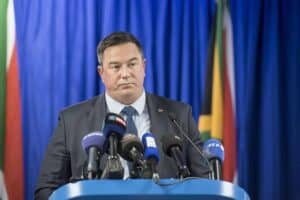‘Steenhuisen and Musk are triggered by the fear that the EFF is prospering and about to take over.’

Nearly three decades into a democracy, South Africa remained a racially polarised nation, with analysts blaming lack of leadership and no attempts made to heal wounds of the apartheid past.
The brouhaha after Economic Freedom Fighters (EFF) leader Julius Malema’s “Kill the boer” chant over the weekend, had not only SA-born billionaire Elon Musk, but also Democratic Alliance (DA) leader John Steenhuisen calling on President Cyril Ramaphosa to exert pressure on Malema.
Criticising Malema for “resurrecting the demon of racism, division and violence”, Steenhuisen warned his party would file charges against the EFF leader at the UN Human Rights Council for inciting mass murder and civil war.
Musk accused Malema of prompting the genocide of white people in South Africa.
Lack of leadership and healing after apartheid was at the core of the racial divide, University of Pretoria politics lecturer Roland Henwood and independent political analyst Sandile Swana agreed – but they were poles apart on the relevance of the slogan.
“This reflects a collective failure of leadership, institutional weakness and a divided society,” said Henwood.
“It also indicates the dangers of populist politics. We must be careful about the way the EFF, and specifically Malema, use this slogan out of context with history.
“It is being used for narrow self-interest,” Henwood said. “It is neither relevant, nor acceptable.”
The impact of the chant on race relations was “complex”, he said. “Research indicates there are generally better relations among South Africans on a person-to-person basis.
“It is at the political level where many issues arise. The challenge is to merge intention with practice,” Henwood said.
Swana said SA never experienced national unity after 1994.
“We are damaged and nobody has taken the trouble to take us through individual psychological therapy in dealing with problems caused by apartheid,” he said.
“Nelson Mandela and Archbishop Desmond Tutu could not talk of a rainbow nation and reconciliation without focusing on restoration and restitution.
“Restitution of the assets was crucial,” Swana said. “After 1994, we needed proper reconstruction and development of the soul – soiled by long periods of apartheid racism, white supremacy and resistance to that.”
In this country, “quite often there are people who raise the old flags of the Boer Republic, with some even raising that of the old South Africa”, Swana said.
“Some have even taken the step of establishing Orania and others have established the Afrikaans technical university Sol-Tech under Solidarity.
“This was done to create an understanding of an Afrikaner independence, which was wanted by the Voortrekkers who did not want to unite with the Africans, Dutch or the English.
“If you visit the website of the Transvaal Landbou Unie, you will see their beliefs in Calvinism,” Swana said.
“When I tried to join the agricultural body, I was unsuccessful because of criteria relating to Calvinism and being non-Afrikaner.
“There are South Africans who have been part of certain periods in history, like those of us who participated in the 1976 student uprisings.
“We still have sounds of black power resonating in our minds.
“When you remember the struggles of the ’80s and early ’90s, you might sing a song – as part of that history, Swana said.
“People complaining about the ‘Kill the boer’ slogan, should understand that it is a theoretical killing. The Marikana massacre was not theoretical, because we did nothing to chase the killers.
“They are chasing Malema based on theoretical killing.
“When Hugh Masekela sings about life in the mines – songs like Emigodini siphethwe njenge Zinja (In the mines we are treated like dogs), those songs are there and not banned.
“We need to delve deep into sociology and anthropology to locate the proper context of these songs,” Swana said.
“There can be nothing more divisive than load shedding implemented the ANC, with sewerage flowing through the streets.
“Steenhuisen and Musk are triggered by the fear that the EFF is prospering and is about to take over as the official opposition and almost knock the ANC out,” said Swana.






